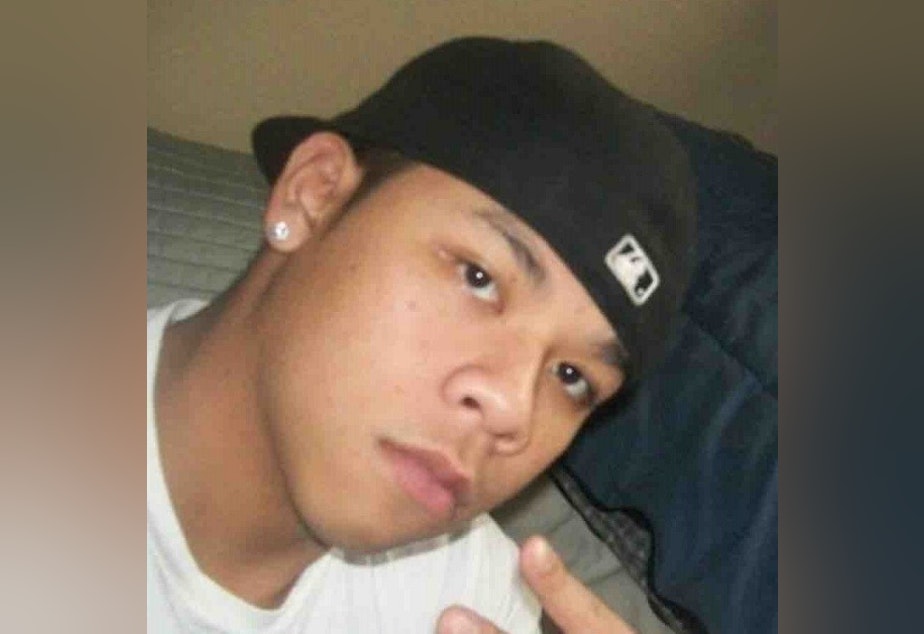Auburn officer charged with murder in 2019 police killing, testing new deadly force legal standards

Auburn Police officer Jeffrey Nelson, 41, has been charged with second degree murder and first degree assault in connection with the 2019 shooting death of 26-year-old Jesse Sarey.
The case is believed to be the first of its kind charged under Washington state's Initiative 940, which eliminates a long-held legal standard of not charging officers in deadly force cases unless it can be proven they acted with "malice."
While an independent investigation of the shooting concluded in June, the King County Prosecutor's Office says it didn't reach a final charging decision until this month.
The review, conducted by the Port of Seattle Police Department's Valley Investigations Team, included forensic analysis of audio captured by a microphone Nelson was wearing, and video footage recorded by a dash cam in his cruiser and cameras outside of nearby businesses.
Nelson was not wearing a body-worn camera during the shooting.
"Our experts determined that Mr. Nelson did not follow his training in a number of ways, and those failures needlessly provoked the circumstances that led to Mr. Sarey’s death," said King County Prosecutor Dan Satterberg in a written statement. "He did not de-escalate the situation. He did not wait for backup."
Nelson is the first police officer to be charged in King County — and likely the state — in a deadly force case since the passing of Washington's Initiative 940 by voters in 2018.
The new legal standard stipulates that the use of deadly force be considered "reasonable" to prevent death or serious harm to an officer or civilians, in order to avoid prosecution.
Previously, police officers could only be criminally prosecuted if evidence supported that they acted with "malice" in their use of deadly force. But under Initiative 940, prosecutors can bring charges against officers who demonstrate negligence in their use of deadly force.
RELATED: Washington state revamps police deadly force investigations
Nelson shot and killed Sarey on May 31, 2019 while responding to a series of 911 calls about a man behaving erratically on the premises of several businesses. Witnesses reported seeing Sarey, who was later found to be under the influence of methamphetamine, throw things at vehicles and kicking property late that afternoon.
Sponsored
Nelson first confronted Sarey at a Walgreens and later reported that Sarey had appeared to be "mentally preparing himself to assault" him, but had not further escalated their encounter.
Jeffrey Nelson Charging Documents.pdf
The two men encountered each other again when Nelson attempted to arrest Sarey for disorderly conduct, after witnesses at Sunshine Grocery on Auburn Way reported his behavior.
Prior to arriving at Sunshine Grocery, Nelson had called for backup. Two separate patrol units agreed to provide assistance, but Nelson didn't wait for them to arrive before attempting to arrest Sarey. A struggle ensued.
Nelson threw seven punches at Sarey's head and upper body after failing to gain his cooperation amid the arrest.
Sponsored
Within 67 seconds of the arrest attempt, Nelson shot Sarey in the abdomen, causing him to fall. Then as Sarey lay propped against a curb incapacitated, Nelson shot him a second time in the forehead. Sarey later died at Harborview Medial Center during emergency surgery.
The King County Medical Examiner determined that the shot to Sarey's head was not immediately fatal. Nelson did not administer medical aid to Sarey after shooting him, court documents state.
However, another officer who arrived on the scene two minutes after Nelson fired the second shot performed "lifesaving measures" on Sarey, who would lose and regain a pulse due to heavy blood loss.
Nelson fired the shots less than four seconds apart, and never deployed the taser he had with him at the time. He said in a statement that Sarey had twice attempted to take his handgun from his belt, and at one point, had pulled a knife out of Nelson's pocket. Investigators said they did not find evidence to support those claims.
A history of deadly force
Sponsored
The case involving Jesse Sarey isn't the first in which Nelson used deadly force.
He shot and killed 25-year-old Isaiah Obet in 2017 while responding to a call about a man, possibly armed and exhibiting odd behavior. In that instance, Nelson shot Obet twice: Once in the torso, and again in the head — as he did to Sarey — as Obet lay on the ground wounded, according to a federal lawsuit filed in June over the killing.
Isaiah Obet Estate V. Jeffrey Nelson Lawsuit
The same lawsuit cites the killing of another Auburn man, Brian Scaman, who Nelson shot in the head and killed during a traffic stop in 2011.
The King County Prosecutor's Office says that it won't seek Nelson's arrest or bail as a result of the charges brought against him Thursday, but officials are requesting that he "be prohibited from possessing any and all firearms" for the duration of this case.
The two charges against Nelson reflect each of the two times he shot Sarey. He faces anywhere from roughly eight to 18 years in prison.

